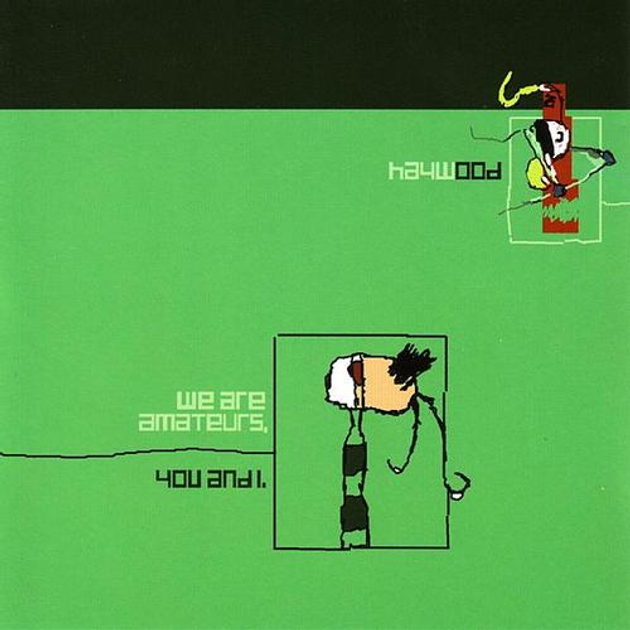
[ALL BAND PHOTOS COURTESY OF JEFF PARETCHAN]
The tale of Haywood's sparkling and formerly final release We Are Amateurs, You And I -- which was issued 10 years ago today, a milestone somewhat overshadowed by some bullshit doo-dad called an "iPod" -- is so enmeshed with the Brooklyn-via-Philly quartet's demise it is hard to pull the two apart. The elements of the story, of course, are not unique (hope, anger, loss, a white knight in tight trousers, resolve, redemption, an A-Team montage where the "plan comes together"), but they don't occur in an order that accommodates a traditional story arc, as you will see. But against numerous if not all Collinsian odds, We Are Amateurs, You And I was issued by Self Starter Foundation Oct. 23, 2001. This piece marks the tin anniversary of that release, and pays homage to Haywood, not the first but perhaps the last great '90s American indie rock band.
If you know me, you know I love the music of Haywood with just about every fiber of my being (indeed, to such an extent we are uncharacteristically drafting this piece in the first person). Some 15 years before I became hopelessly fixated on the mighty Johnny Foreigner (not to mention all the other acts over the years), I was (and continue to be) embarrassingly fanatical about this band from my hometown. Fronter, guitarist and primary songwriter Ted Pauly was raised in a house blocks from my own, and seeing a proto-version of Haywood performing covers of Lemonheads, Camper Van Beethoven and Psychedelic Furs songs at a house show in late '90 or early '91 sold me completely on the configuration of alternately wry and down-in-the-mouth Mr. Pauly up front and truly gifted drummer and raconteur Rob Viola in the back (at the time of this particular show, I think bassist Jeff Paretchan had already gone off to college, and Haywood lead guitarist Ariel Serbin's future role was still being played by dear friend and veteran drinking buddy Luke Abruzzo).
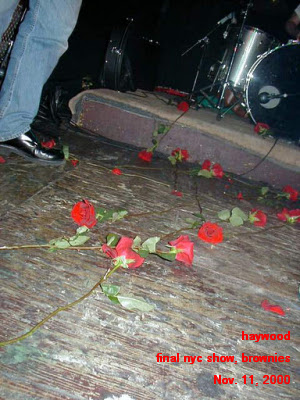 "Rob, Ted, Ariel and I had played together in high school in [the band] Garden Party," Paretchan recounts. "Haywood started in the summer of 1992. I had finished my sophomore year [of college] and everyone else their freshman year. As I recall it was Rob and I who 'founded' Haywood during a conversation driving around the back streets of Radnor in Rob's blue Subaru station wagon. That summer we recorded four songs at American University with Rob Christiansen of Eggs. The sessions were a marathon 24 hours to record and mix. Two of the songs "Nerf Dreams" and "Trash Park" would appear on our first 7" and then later on [the full-length] Model For A Monument."
"Rob, Ted, Ariel and I had played together in high school in [the band] Garden Party," Paretchan recounts. "Haywood started in the summer of 1992. I had finished my sophomore year [of college] and everyone else their freshman year. As I recall it was Rob and I who 'founded' Haywood during a conversation driving around the back streets of Radnor in Rob's blue Subaru station wagon. That summer we recorded four songs at American University with Rob Christiansen of Eggs. The sessions were a marathon 24 hours to record and mix. Two of the songs "Nerf Dreams" and "Trash Park" would appear on our first 7" and then later on [the full-length] Model For A Monument."Trying to hit fast-forward from that humble, suburban beginning to the end of the band is difficult, because it's hard to determine when Haywood ends and the rest of our lives begin. Did Haywood stop sighing with the turn-of-the-century departure -- for personal reasons -- of Mr. Serbin? Did the quartet's heart stop beating when Pauly declined a long-hoped-for record-and-tour-support deal? Or when Mssrs. Viola and Paretchan quit the band in the wake of Pauly's decision? Did Haywood go the way of the Dodo when it played its final show in December 2000 at Brownie's in Manhattan? Or did Haywood give up the ghost only after the surprise self-release of its second post-humous set, 2006's As Long As There Is Track, I Will Not Go Back? Is Haywood undead? Actually dead?
We're fairly confident the answer to that last question is yes. But Amateurs for five years had the patina of finality in the minds of fans and band members alike, who assumed Haywood's 2001 break-up signaled the end of the band for good. The record was released by Chris Newmyer's delightful Self Starter Foundation label. That Amateurs garnered critical acclaim from chief Mountain Goat and music journalist John Darnielle [link] and even Pitchfork [link] was exciting to long-time fans, but probably a bit sad and frustrating for Haywood. That's because, although from the outside the band appeared to be just at the cusp, or, as Darnielle put it here, "like a magnolia just about to bloom," in fact the band had agreed to call it quits well before the album was even recorded. When the break-up was finally made public, it seemed like a capitulation to the powerfully poignant sense of loss and resignation that drove Haywood's best songs.
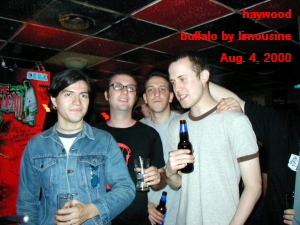 "We did keep [the break-up] a bit of a secret," at least from folks who had no need to know, confesses Mr. Newmyer, who we caught by phone in between his scheduled stints managing the current Ra Ra Riot tour. Newmyer is quick to point out that the hush wasn't from any inflated sense of importance of the news, but rather because the band wanted, if possible, to keep album reviews focused on the music.
"We did keep [the break-up] a bit of a secret," at least from folks who had no need to know, confesses Mr. Newmyer, who we caught by phone in between his scheduled stints managing the current Ra Ra Riot tour. Newmyer is quick to point out that the hush wasn't from any inflated sense of importance of the news, but rather because the band wanted, if possible, to keep album reviews focused on the music."It's an excellent work of catchy indie-pop, reminiscent of Built to Spill, with a profoundly personal and sentimental side," observed Pitchfork's Brad Haywood. Really, that was his name.
"What terrible timing," summed up critic Eric Herboth in his review of the record for Lost At Sea.
Over the course of its career, Haywood found incredibly stirring ways to synthesize the desperate power of Midwestern, second-wave emo and the grace of the most genteel indie pop. But as Pitchfork's scribe astutely recognized, Haywood's greatest strength was not necessarily in writing and performing the songs, but in conveying the emotions driving them. I've listened to the song "Plow" from Amateurs about 400 times in the last two years; I still find the lyric "I was hoping I'd catch you out of luck" devastating. Pauly's voice breaking at the end of the line "your words get caught in your throat" from his ode to Viola "Tough Hero" on paper seems calculated, but the recording is terrifically affecting. The tragic finality of "Paper Shirt," the album's denouement, is like a sublime slap across the face. And "Come On Tell The Truth," we could go on and on about how it almost hurts to hear it. The record's not all sad stuff, though: album openers "The Last Days of Baronov" and "Button Up, Buttercup" both soar with exuberance, and "Don't Go Breaking (My Heart)" earns the band all of the Superchunk comparisons. All of We Are Amateurs, You And I is embedded at the foot of this piece; you can stream or download all of the tracks.
When I saw the 10th anniversary of the release approaching, I got in touch with Pauly, Viola, Paretchan, late-period lead guitarist Danny Barria (formerly of Philadelphia's Clock Strikes 13, now of deservedly hyped The Big Sleep, which is about to release its long-awaited sophomore set Nature Experiments on French Kiss Jan. 31), producer Adam "Red" Lasus and Newmyer to see if anyone was willing to talk about the record. Happily, everyone was eager to take some time to think about how the record was made and what it meant in the scheme of Haywood things.
"The record holds up to any indie rock coming out now and is more fully realized than a lot of current indie action," says Mr. Lasus, who -- in addition to recording much of the Haywood catalogue -- also recorded classic indie rock albums including the self-titled Clap Your Hands Say Yeah record, Versus' peerless The Stars Are Insane, Helium's The Dirt Of Luck and Lilys' towering A Brief History Of Amazing Letdowns. "In many ways [Amateurs] was the last real indie rock record I made."
Newmyer is similarly effusive. "I got to put out a bunch of good records, but to this day the second Haywood record [released on Self Starter Foundation] is not only one of my favorite Self Starter records, but one of my own favorite records."
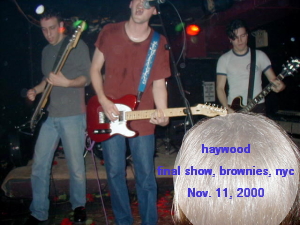 Had the band committed to significant touring to support Amateurs, the recording sessions would have been paid for and the album released by a label, although somewhat comically the band members aren't quite certain which one; it may have been Southern Records. Instead, faced with the departure of founding lead guitarist Serbin and dogged by concerns about the practicality of pursuing the rock and roll dream, Haywood disbanded.
Had the band committed to significant touring to support Amateurs, the recording sessions would have been paid for and the album released by a label, although somewhat comically the band members aren't quite certain which one; it may have been Southern Records. Instead, faced with the departure of founding lead guitarist Serbin and dogged by concerns about the practicality of pursuing the rock and roll dream, Haywood disbanded."I think it was somewhere around December of 1999 that we had played a couple of shows in New Jersey with Ariel," Paretchan says, "after which he decided to quit the band. Rob, Ted and I met at [the restaurant] Veselka to talk about the deal we were being offered. I don't remember which label [it was], but I thought it was someone other than Southern. It was a cold rainy night -- maybe in February of 2000? Ted expressed a lot of hesitation."
"I remember [Ariel's departure] making me even less hopeful for the future," Pauly concurs.
"I do remember that Ariel quitting the band was a big issue," Paretchan agrees. "We had the offer of money for recording and tour support, but we would have to do real touring. Ted wanted to do other things -- settle down, [and] focus on his work."
"Somehow I felt like it was time for me to do grown-up things, whatever I thought those were at the time," recalls Pauly. "My rationalization was that I thought even Superchunk must've been having a hard time making a living, in Chapel Hill, where the cost of living was probably silly cheap, right? Of course I never called them, so how could I have known? I didn't know Superchunk."
"Yes, we broke up in Veselka," Viola agrees, "...great borscht."
"Rob and I were pretty surprised/disappointed, angry," Paretchan continues. "We had been playing together for a long time and finally were getting a good break after lots of work, and Ted wasn't interested. Rob and I went across the street after we finished at Veselka to some dive bar, ordered some drinks and basically decided to quit Haywood and start another band."
But then something very interesting happened: after being unwilling or unable to accept the record deal, the remaining members of Haywood decided to make a new record anyway. And, ironically, the guys attribute the quality of the performances and recording sessions at least in part to the fact that there was nothing on the line.
"We decided to record album anyway because we all loved the music," according to Viola. "I remember feeling that we could do whatever we wanted when we made this album. The band was a bust and we had nothing to prove."
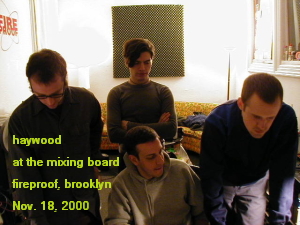 "There was a total sense of freedom," Paretchan emphasizes. "Nothing to prove, and we could really do whatever we liked, without having to think about what people would think."
"There was a total sense of freedom," Paretchan emphasizes. "Nothing to prove, and we could really do whatever we liked, without having to think about what people would think."The mix of emotions regarding the band's break-up colored the recording sessions, Paretchan suggests. "There may have been some 'anger' about the ending of the band that translated into the rock numbers 'Baronov,' 'Buttercup,' 'Moscow,' [and] 'Don't Go.'"
Of course, at the moment, Haywood had no lead guitarist. This hurdle was soon overcome, however. Mr. Barria -- like the members of Haywood -- had migrated to New York from Philadelphia with hopes of a career in music taking off. He had crossed paths with the Haywood guys while everyone still resided in the City of Brotherly Love, and that early connection proved crucial.
"[W]e found Danny, who tamed his huge guitar enough to sit in the mix, and wrote his own parts for [the songs]," Pauly remembers. "He was a goddamn gift and is largely responsible for the existence of the record and any optimistic notes on [Amateurs]."
"My Haywood memories are always going to start from the fan perspective, because I loved them," says Barria. "Still have my Great Cats Give Chase tape [an early self-release. -- Ed.] somewhere. I saw them [play] at Upstairs At Nick's in '97 (may have been a show with Zumpano), and my very first impression of them, before they'd even played, wasn't a good one. They all wore suits that night (which I subsequently learned isn't really the Haywood way) and seemed a little nerdy to me. I saw Rob making out with a girl and I remember saying to myself 'Alright, Romeo, take it easy.' Anyway, I was [too] quick to judge because once they started playing I also said to myself, "these are really good songs, and dude is an amazing drummer.' I got the Great Cats tape that night, and that was that, hooked."
"I know Ted and I had a bit of an email correspondence going on," Barria continues, "and I remember exactly where I was sitting, sometime around February of '00, when he sent me a message asking if I knew any guitarists because they had just lost theirs. I jumped on it because starting/joining a band was the only reason I'd moved to New York. The deal was that Ariel had just quit but they had written an album's worth of material and they wanted to play some shows and record before calling it a day. Ted was planning to get married and Rob and Jeff were going to continue playing, but [the demise of Haywood] was definitely a done deal going into it, that they'd decided not to continue after the next record. That was kind of sad and weird, but I was just really happy to be playing their songs with them."
"Danny was very important in the different sound of this record," Paretchan offers. "Big hooky guitar parts. [At a] critical moment, when we lost one of our founding members, Danny really stepped in and made a big difference. Ariel and Danny are different types of players. At the time I think that Haywood needed a confidence boost -- and Danny's playing gave it to us. I didn't really realize how great it was to have Danny around until we finished the mixes and I thought 'Wow, this record sounds huge!'"
Barria found his entrée into the band to be a little disconcerting. "I remember taking my Gibson 335 and my Peavey Bandit 65 and my pedals on the subway from the East Village to Rob's (and Ariel's?) place on Grand and Marcy. I had no idea where I was going, and it sucked carrying all that, and I got there and they had a fucking Peavey Bandit 65 in the basement. And then after being nervous about trying out, Ted mentioned he didn't really like my Gibson."
"I remember Ted suggesting Danny to step in as lead guitar for a few remaining shows and to record Amateurs," says Paretchan. "The first practice was at Rob's place in Brooklyn. Danny came in with the Peavey Bandit, a black strat copy and some sort of rackmount echo/delay thingy. My first impression was 'Whoa what is up with all this space guitar stuff?'"
"Anyway," Barria goes on, "my first show with them was at the Continental and I fucked up the first note of the first song I played with them. We played more shows throughout the year and went on a little tour, too, I think Wesleyan and two other spots. My favorite moment was breaking down in Herkimer, NY, on the way to a show in Buffalo and Rob somehow lining up a white limousine to take us the rest of the way."
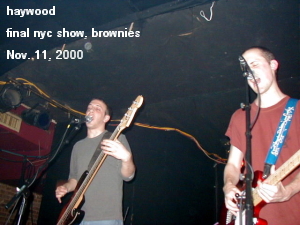 Haywood then turned its attention to recording its swan song. After a disappointing recording session with Kramer in New York in 1994, Haywood placed a lot of importance on working with a producer it trusted; Lasus had helmed early recordings as well as the sessions for Haywood's brilliant second full-length, 1999's Men Called Him Mister, and choosing him again to record Amateurs was a slam-dunk decision.
Haywood then turned its attention to recording its swan song. After a disappointing recording session with Kramer in New York in 1994, Haywood placed a lot of importance on working with a producer it trusted; Lasus had helmed early recordings as well as the sessions for Haywood's brilliant second full-length, 1999's Men Called Him Mister, and choosing him again to record Amateurs was a slam-dunk decision."We recorded for the first time with Adam [in 1993]," Paretchan recalls. "We did five songs together [which ended up circulating on a tape fans called Red's House Sessions and included an alternate take of "Nothing Happens" with Barnabys' Joey Sweeney doing backing vocals; the music was eventually compiled onto Model For A Monument]. So the connection with Adam goes back a long time before we ever did Amateurs."
"We had a super comfortable and fun studio dynamic [recording the record]," adds Lasus. "The ideas and concepts were falling into place without really having to talk about them. The sounds were big, but not too big, and the songs were really all brought to their peak."
"Red was a huge part of this album," Paretchan states, "and so was recording at Fireproof [then in Brooklyn, now based in Los Angeles -- Ed.]. Working with Red was so easy, he always understood what we were looking for, we were familiar with the space and the equipment. I remember recording to tape and all of us at the board for mixing which was a big part of the fun."
"There were two nerve-wracking moments for me," Barria remembers, "when the parts I'd come up with didn't work for whatever reason (we hadn't played some of the songs live a lot, think I was just working off of demos on those, might be wrong about that), the intro on 'Tough Hero' and the mid-section on 'Paper Shirt,'and I had to rethink and come up with something else on the spot, which is weird to think about when I hear the songs now, they just seem like the songs they've always been, kind of assured, which I think is more of a testament to how good [Haywood's] songwriting had gotten than anything else."
"Incidentally," Pauly says, "all the songs [for Amateurs] were all written in the Ariel-era, 'Paper Shirt' being the last, written in the last, waning daylight of the last days of Ariel."
"My favorite part of the whole recording, though, was the very last bit of tracking, the end of 'Paper Shirt,'" Barria recalls. "Rob kept telling me to lay down some kind of 'sweet lead' or whatever, and it just wasn't happening, we tried for a while. So Ted said 'Well, let me try,' he sat down with the guitar, and it was the perfect moment, for the song and just as a recording experience, as a witness. It was one take, and it was perfect, it's what's on the album. And it seemed really appropriate that the last guitar part on the last song was recorded by Ted, and the last bit of the song as it winds down is just the four of us keeping it quiet."
"I had forgotten about Ted's solo at the end, but Danny totally has it right." Paretchan agrees. "That's exactly what happened."
Is it the band's greatest album? Sure, what the hell. There are various arguments against the primacy of Haywood's other releases, anyway, although they are fine releases all. The band's full-length debut, Model For A Monument, was actually a comp of a bunch of early material that some fans had had for months if not years. Men Called Him Mister, released in 1999, was the last record to include the founding quartet and it was released once the band had immigrated from Philly to Brooklyn. But while the record is amazing on a lot of levels, it could have been a bit more succinct; a couple songs could have been relegated to b-sides, and the criminally omitted "Empty Car" and "Alpenland" should have been included, in my opinion. Haywood's doubly post-humous surprise 2006 collection As Long As There Is Track, I Will Not Go Back is blindingly brilliant and shockingly ignored, but as it was a studio project only and came so long after the band's original dissolution, it doesn't feel like a perfect fit for top dog status, either.
The rhythm section, anyway, certainly believes Amateurs captures the band at its peak.
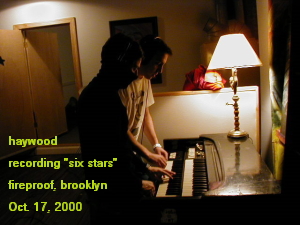 "This LP captures the band at the heights of [its] tightness and instrumental powers," Viola agrees. "One could argue that Men Called Him Mister had better hooks [and] writing, but the the playing on Amateurs is confident and massive."
"This LP captures the band at the heights of [its] tightness and instrumental powers," Viola agrees. "One could argue that Men Called Him Mister had better hooks [and] writing, but the the playing on Amateurs is confident and massive.""I agree that Amateurs is more confident and epic," add Paretchan. "Although Amateurs couldn't have happened without Men Called Him Mister, which was where we cut our teeth on various production techniques and sounds which would later show up on Amateurs. We were already familiar with Adam's guitars, amps, pedals, etc. and how Adam worked. This all helped on Amateurs."
"All the Haywood sessions were super important to me," says Lasus, "but this one was one of those 'Wow, this is a great album from top to bottom.'"
"The recording of this record is very much tied for me to the final NYC show at Brownies," Paretchan says. "Both were bittersweet -- pinnacles of recording or live performance, and both signified the end of the band in very real ways. I know that the day after the final NYC show at Brownies, I woke up and listened to Born To Run start to finish sitting in my room. I found out later that Rob had done exactly the same thing."
Viola sums up my feelings, exactly, every time we put on one of Haywood's records: "Fuck, man, I miss this band!"
"We had no idea at the time that we would later record As Long as There is Track... so it was a sad time," Paretchan remembers. "Especially given the strength of the album and the response in the press. There was a sense that we had really hit our stride and were about to get somewhere after so many years of effort. Dashed hopes... Even to this day, nothing has ever been as much fun as writing songs, playing shows and recording with Haywood, because it was always about a group of friends making music that they liked together. Even though Rob and I were pretty pissed about having to bail on the record label offer -- we just couldn't help ourselves from wanting to record those songs. Which is probably why we joined up together to work on As Long As There Is Track, even though we had no future as a band anymore. Just can't resist those songs!"
THE SONGS, IN THE BAND'S OWN WORDS
LAST DAYS OF BARONOVHaywood - We Are Amateurs, You And I. (2001 album release) by statikluft
Pauly: "This song is about my brother and my grandfather's dead Saint Bernard."
BUTTON UP, BUTTERCUP
Pauly: "I felt like there was a lot of sad, impressionistic emo coming out, and I just wanted everyone to look on the bright side."
SIX STARS
Pauly: "I wrote a sad, impressionistic emo song about the lack of stars with all the damn city light pollution. This was a slow dance about my then-future wife. I tried to play it at Rob and Emily's wedding years later, but I always struggled through the solo beginning with the full band; why should it be any different on my own." Paretchan: "Danny and I played the a "four hand" organ part on 'Six Stars' together on a Hammond C-3 in the studio. The falseto vocals... were a tip of the hat to Ariel's vocals on 'Keystone Rag' from Men Called Him Mister."
TOUGH HERO
Pauly: "This song viscerally recalls the feel of an early-'90s night at Fergie's Pub [in Philly] with Rob. Drinking with Rob in Philly in the '90s remains unrivalled for overall end-of-night satisfaction. I also remember that the flangey guitar sound on this one made me feel, every time we played this live, like I was playing "Just the Way You Are" by Billy Joel.
PLOW
Pauly: "This was about my friend Brian [McGrath], who was in Wendyfix, and then co-wrote a song on our second record ("Little Black Dress Club") and then went to Maine and then played in Mantissa and then once we walked around Ground Zero and then he disappeared." Paretchan: "Keyboard parts were usually something we saved for the studio, as we could never do them live. This meant that most of the parts got written/worked out in the studio. I think Rob played the keyboard flute sound on 'Plow' -- this was also our first tune to use drum machine, no? Using a Roland MC 303. And I played the keyboards on the bridge. I remember playing the keyboard part on 'Plow' while Rob was turning the dials on the Korg Toneworks delay pedal."
HOTEL BAR IN MOSCOW
Pauly: "I have never been to Moscow. I think this one was tangentially about breaking up with someone. I liked to steal '80s lyrics for my songs. Here, Aretha Franklin's "Freeway Of Love," except we get off it in a pink hatchback with no one driving. Somehow I thought that was a metaphor for my love life at one time."
COME ON TELL THE TRUTH
Pauly: "I think-- think-- this one had been kicking around for a long time. I feel like I remember playing this fairly early, at a show with Pee Shy? and The Joey Sweeney at Under Acme." Paretchan: "the lyrics 'I wanna be just like my dad / and marry the first real thing I ever had / Everyones busy slipping it into conversation / and I'm patient / but not that patient' always struck me as a painfully personal and honest lyrics. I played the Roland MC303 through a MicroSynth pedal that Rob was messing around with to get the sound -- this part was written in the studio, and really filled in a lot of what I thought was missing with my bass part on this song."
DON'T GO BREAKING MY HEART
Pauly: "I just hoped to get a little of the shine from Elton John and Kiki Dee on this one. This felt like our most Rainer Maria song. It was up at the top of my range and felt my most emotive, and I loved to play it and it was also, (duh) about breaking up, very clearly about my college girlfriend. It also features our dubbiest bridge." Paretchan: "Recording 'Don't Go Breaking My Heart' was challenging; it was hard to capture the energy and volume of the live performance in the studio."
PAPER SHIRT
Pauly: "I think Ariel gave me paper pajamas from a trip somewhere, or maybe just to Pearl River. This was about being 90 and deciding to go outside for the first time in a long time, and deciding to dress up in my finest paper shirt, which of course would be a bad idea in the rain." Paretchan: "'Paper Shirt' was an after-thought in a way. One of the reasons I think the record sounds better than Men Called Him Mister was simply that we had fewer songs to record. If I'm not mistaken, one of the other issues the band was facing was not only having to decline the offer for recording and tour support - but also that Ted seemed to be having writers block and we weren't able to put together any more songs. 'Paper Shirt' got on because we needed an album's worth of material. I recall doubts about the strength of the tune. Somehow it is a nice post script to the album in the way that it gently disappears at the end."
2 comments:
This was a joy to read, so much thanks. And thanks for introducing me to a great band that I would have been sad to have missed.
Thank you so much for this post. Haywood's been one of my favorite bands for years--they're #17 on my Last.fm chart--but I know essentially nothing about them. This was an incredible discovery for me and a real source of joy. I really appreciate you making the effort to memorialize this brilliant, barely-known band.
Post a Comment